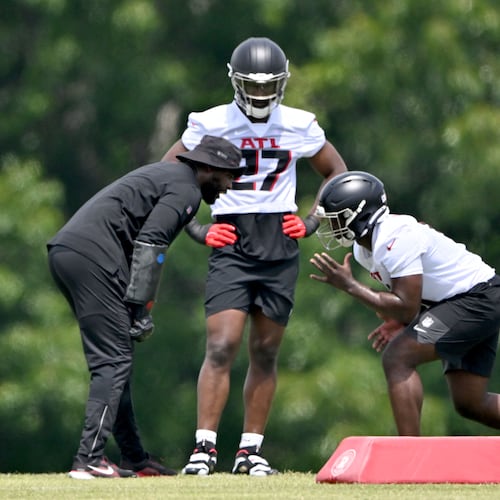Editor’s note: This is the seventh of an eight-part, position-by-position series analyzing the Falcons’ 2021 season under first-year coach Arthur Smith. Today: Secondary
FLOWERY BRANCH -- The Falcons opened the season with new starters in three of the five key secondary positions.
A.J. Terrell retained the left cornerback position, and Isaiah Oliver kept the nickel back spot that he slid into in 2020.
The Falcons gave up 232.5 yards passing per game, which ranked 18th in the NFL. Their interception rate of 2.08 ranked 19th.
Fabian Moreau took over at right cornerback, Duron Harmon at strong safety and Erik Harris at free safety. Jaylinn Hawkins, would see significant time at free safety, at first splitting time and then taking over after Harris was lost for the season.
The nickel back became problematic after Oliver was lost for the season with a knee injury after the loss to the Washington Football Team in Game 4.
Rookie safety Richie Grant, the second-round pick, finished the season as the primary nickel back.
Teams didn’t really have to attack the Falcons’ secondary. In Game 16, Buffalo just elected to run the ball.
“I guess we just played defense, made plays when they were there, and they just made a halftime adjustment and started running the ball more,” Terrell said.
Terrell showed that he could match up with one of the league’s top receivers when the Falcons played the Bills.
“Just a game plan we had coming in and just low on bodies, team-wise, so we just had to make things work,” Terrell said. “Stefon (Diggs) is a great receiver in the league. Much respect to him. That was just a job and a task that I had.”
Rookies Darren Hall and Avery Williams also pitched in at cornerback.
Harris made 64 tackles, but he missed 11 tackles and had the highest missed-tackle percentage (14.7%) on the team.
Hall received his first start against the Bills in Game 16.
Grant, Hall and possibly Williams will get a shot to help in the future. Hawkins is set to take over at free safety.
“I’m pleased with them,” Falcons defensive coordinator Dean Pees said. “Actually, they made some mistakes, like every player has, and they’re typical rookie mistakes.”
Pees knew the rookies would struggle with the new 3-4 system.
“We’ve made a lot of growth,” Pees said. “So I’m expecting going into next year, that that growth will really pay off. And so, you know, you take your lumps, sometimes learning the system.”
The rookies will not have to re-learn the system.
“They’ve been through it,” Pees said. “And so hopefully, starting out next year, it’s not going to be like brand new to them. There is going to be a lot of carryover and then we get hopefully with COVID ever gets gone, we’ll have a spring and all that kind of stuff and meet with them and do all that kind of stuff, that it’ll pay off in the long run.”
With Terrell, who finished with three interceptions, holding down his side of the field and the nickel-back situation stabilizing, the Falcons started to play better.
Pees pointed to the Falcons’ 12-game streak of having a turnover heading into the finale against the Saints.
“The thing is we just have got to get better,” Pees said. “I’ve seen tremendous strides from early in the season where it seemed like pretty much whatever you called there was one guy making a mistake somewhere. Whereas (late in the season), there’s a lot of calls, and nobody is making a mistake.”
Overall, opposing quarterbacks had a 97.4 passer rating against the Falcons.
“The thing that we just really have to develop in the offseason and before next year is the ability to rush the passer and not always have to pressure to do it,” Pees said. “And No. 2 is to be able to play man coverage better in the back end. It’s kind of a twofold thing, if you don’t get to the quarterback that means a secondary is hung out there forever, and that’s not good.”
Falcons’ position-by-position analysis:
Part 1: Running backs
Part 2: Quarterbacks
Part 3: Wide Receivers/Tight ends
Part 4: Offensive line
Part 5: Defensive line
Part 6: Linebackers
Part 7: Secondary
Part 8: Special teams
The Bow Tie Chronicles
About the Author
Keep Reading
The Latest
Featured


